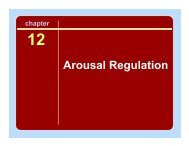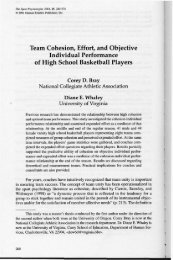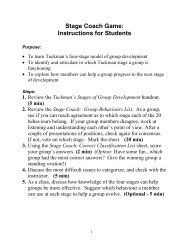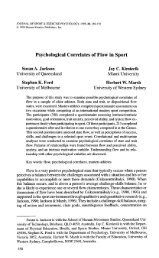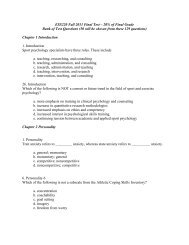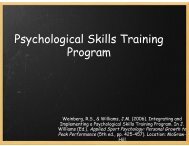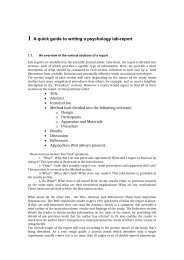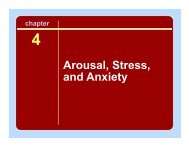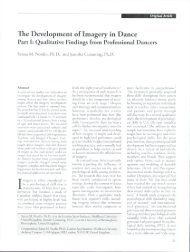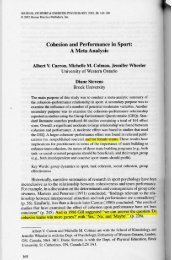Sport and Exercise Psychology Review - Sport Psychology Goes to ...
Sport and Exercise Psychology Review - Sport Psychology Goes to ...
Sport and Exercise Psychology Review - Sport Psychology Goes to ...
You also want an ePaper? Increase the reach of your titles
YUMPU automatically turns print PDFs into web optimized ePapers that Google loves.
<strong>Sport</strong> psychology consulting with athletes<br />
with disabilities<br />
Jeffrey J. Martin<br />
Athletes with disabilities, like all athletes, can benefit from working with sport psychology professionals. My<br />
goal in the present article is <strong>to</strong> update <strong>and</strong> exp<strong>and</strong> upon my (1999) paper describing a human development<br />
model of psychological skills training. I present research findings <strong>and</strong> recommendations within the<br />
above conceptual framework based on three related categories of psychological skills <strong>and</strong> methods, along with<br />
unique considerations for working with athletes with disabilities. First, I discuss foundation skills such as<br />
the development of self-determination <strong>and</strong> self-esteem. Then, I present information on traditional performance<br />
skills <strong>and</strong> techniques like goal setting <strong>and</strong> anxiety management. Finally, I provide a review of facilitative<br />
fac<strong>to</strong>rs that impact on performance <strong>and</strong> quality of life such as coaching quality <strong>and</strong> injury<br />
awareness.<br />
‘You’ve got <strong>to</strong> keep your mental attitude positive all the way . . . even if you think a little negatively, your<br />
just <strong>to</strong>asted. Once the water temperatures get colder, you have <strong>to</strong> have a really strong attitude <strong>to</strong> carry on.<br />
Believe it or not, you have <strong>to</strong> ignore the cold water. And that’s very hard <strong>to</strong> do with a negative attitude –<br />
with every stroke your probably thinking, Damn, this is cold water! You’re not supposed <strong>to</strong> do that! Your<br />
supposed <strong>to</strong> be thinking, Don’t worry it’ll only be a few more hours.’<br />
THE ABOVE quote is from Carlos Costa<br />
(Bendall, 2004), a bilateral amputee<br />
marathon swimmer, who became the<br />
youngest person (20 years old) <strong>to</strong> swim<br />
across Lake Ontario (Canada) in 1993. His<br />
quote clearly illustrates the importance he<br />
placed on the mental challenges of his performance.<br />
More specifically he cites his<br />
upbeat attitude, concentration ability, positive<br />
self-talk, <strong>and</strong> thought control skills as all<br />
critical mental fac<strong>to</strong>rs that contributed <strong>to</strong> his<br />
success. In the early 1990s sport psychologists<br />
began <strong>to</strong> note the importance of psychological<br />
skills training (PST) for athletes<br />
with disabilities (Asken, 1991; Clark & Sachs,<br />
1991). The sentiments of these authors<br />
have recently begun <strong>to</strong> be substantiated by<br />
athletes with disabilities who have acknowledged<br />
their receptiveness <strong>to</strong> sport psychology<br />
consultants (Page et al., 2001). The<br />
writers of many of these early publications,<br />
however, emphasised the use of mental skills<br />
for performance enhancement purposes<br />
(e.g Clark & Sachs, 1991; Hanrahan, 1998)<br />
or very broadly defined psychological skills<br />
<strong>and</strong> inferred mental skill development from<br />
mood state scores (e.g Henschen et al.,<br />
1992). Few sport psychologists, however,<br />
have explicitly emphasised personal development<br />
in combination with optimizing athletic<br />
success (Martin, 1999a). The purpose of<br />
the current article is <strong>to</strong> update <strong>and</strong> exp<strong>and</strong><br />
Martin’s (1999a) article which addressed the<br />
above shortcomings. The theoretical framework<br />
for this article is Vealey’s (1988) human<br />
development model of PST, which revolves<br />
around foundation skills, psychological skills<br />
<strong>and</strong> methods, <strong>and</strong> facilitative fac<strong>to</strong>rs.<br />
Foundation skills<br />
Vealey’s (1988) model emphasises the<br />
importance of developing self-determination,<br />
self-awareness, <strong>and</strong> self-esteem because<br />
the value of developing such positive characteristics<br />
is important for personal growth <strong>and</strong><br />
performance (Vealey, 1988).<br />
Self-esteem<br />
Self-esteem is a critical component of<br />
mental health (Rosenberg, 1979), <strong>and</strong> life<br />
adjustment (Sonstroem, 1997). <strong>Sport</strong> is<br />
more likely <strong>to</strong> influence physical self-esteem<br />
32 <strong>Sport</strong> & <strong>Exercise</strong> <strong>Psychology</strong> <strong>Review</strong> Vol 1 No 2



